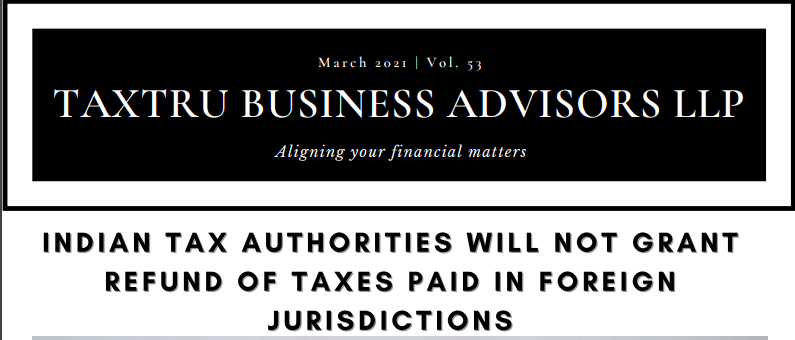Indian Tax Authorities Will Not Grant Refund of Taxes Paid In Foreign Jurisdictions
Indian Tax Authorities Will Not Grant Refund of Taxes Paid In Foreign Jurisdictions
The Hon’ble Mumbai ITAT in the case of the Bank of India , has held that an Indian tax payer will not be entitled to claim refunds from Indian tax authorities for taxes paid in foreign countries on income earned in the respective jurisdictions, if the same income is not taxed in India due to a loss. However the taxes paid are allowed as deduction in the course of computation of Business Income, as per the provisions of DTAA, but only proportionately and full foreign tax credit cannot be assumed permissible as a matter of course and normal practice.
The Hon’ble court has dealt with an interesting question of law in this case that whether an Indian taxpayer can claim refunds from the Government of India of taxes paid by the said taxpayer outside India, i.e., the foreign Governments, in respect of the income taxes paid abroad on income earned in the respective tax jurisdictions. It’s like someone making a contribution to, say, the US Exchequer because an income was earned there, and claiming that the Indian Treasury refunds the said tax because the aggregate of overall taxable income, from all the operations worldwideincluding India, is in negative, i.e., a loss figure. In effect, one pays tax, for example, to the US and seeks its refund from the Indian Exchequer.
The court held that the assessee bank will be declined the foreign tax credits for Rs 182,64,22,948, and thereby not entitled to seek a refund of that money from the Indian tax exchequer. By providing the said judgement the court has reinforced the fact that the full tax credit for source taxation cannot, as such and to that extent, be extended in the residence jurisdiction when a tax treaty sanctions only proportionate credit, and does not, in any case, specifically provide for the full foreign tax credit. A full tax credit, which goes beyond eliminating double taxation of an income, actually
ends up subsidizing the foreign exchequer, to the extent that the taxes paid to the foreign exchequer are allowed to discharge exclusive domestic tax liability, rather than eliminating double taxation of an income, and that is the reason that even in the solitary full credit situation visualized in the Indian tax treaties, in the Indo Namibia tax treaty, it’s one-way traffic inasmuch as while India, as a relatively developed nation, offers, under article 23(2), full credit for taxes paid in Namibia, whereas, in contrast, Namibia, as a developing nation, offers, under article 23(1), proportionate credit for taxes paid in India. The court has even held that when such huge national revenues, involving thousands of crores, are involved in this macro issue, one cannot afford to be superficial, or perfunctory, in its approach. On a separate note, nevertheless, it was upheld that the claim of these taxes paid abroad will be allowed as a deduction in the computation of the business income of the assessee.
 TaxTru Business Advisors
TaxTru Business Advisors
Consultants








